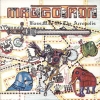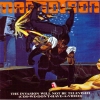Maggotron, also known as DXJ (James McCauley), is not only one of the pioneers of bass music (also known as Miami Bass and Booty Bass). Unlike The 2 Live Crew, his records were never about sex, this is why the term «Booty Bass» is certainly not a good choice to describe DXJ’s music. DXJ - DX (i.e. the Oberheim DX drum machine) for the machine, J for James - was always about fun and fun only. However, from a postmodernist point of view, his records reveal considerable depth. Eclecticism is one of his record’s most notable features: «Sampling galore as usual, and they really use everything that they were able to find, be it Chinese opera or excerpts from radio shows. He produces whole songs out of one simple funk loop and mixes it up with some electro-beats» (my translation, here’s the original version: «Wie üblich wird gesampelt, was das Zeug hält und wirklich alles verwurstet, was einem vor die Räder fällt, seien es chinesische Opern oder Sprecheransagen, aus Funk-Loops werden nach wie vor ganze Tracks produziert, garniert mit den Electro-Beats»), mm writes on www.musicmatic.de ? of course, this statement hails from a modernist rather than a postmodernist point of view. DXJ, who credits P-Funk innovators and icons Parliament/Funkadelic as most influential in terms of his many records, is definitely a very eclectic artist, but in the context of hip hop (which used old records from day one) this should be viewed as a quality - although in other styles of music, quotations and so on are equally traceable; and can be easily justified in postmodernist terms - because for one thing art and culture always are based on old art anyway; and there is no practice beyond quoting in any case. People are like the Dude in «The Big Lebowski»: they quote, and this is certainly not a bad thing - although modernism with its (historically rather new) idea that only originality is what makes art into something non-trivial.
There are many other postmodernist traces in DXJ’s art. For example, he uses many pseudonyms. DXJ explains on www.electroempire.com: «I wanted as many records out as possible,and most of the record companies were like ‘no, not yet wait’, so that is one reason for all of the names, as well as being able to have stuff out on other labels, or to come with something different that might not be associated with one of the names.» Another reason may be that DXJ also likes to toy with different identities - a very postmodernist way of approaching identity. Another typical feature of postmodernism is irony. This is certainly a feature of hip hop in general, but DXJ with its fun-oriented lyrics probably goes even further. Here, it is always clear that the rhetoric is humorous - even to people unfamiliar with African American use of language.
Whereas from a modernist point of view, art has to - in any case - enlighten us about something and to tell us something we don’t already know, postmodernism is ready to admit that art may be entertainment and entertainment only ? a very liberating move, since now it is no longer necessary to think in terms of «low-brow» and «high-brow», «non-commercial» and «commercial». DXJ also admits that he started making bass music in order to survive - «you could not make records and survive in the MIA unless you did Bass», he told electroempire.com. But does this mean his records are not as good as tracks by conscious rapper Common or Alternative R&B singer Erykah Badu? No! In fact, his music is much more interesting, if you apply postmodernist criteria. On «Zingen Zangen Gezungen» (1989, from «Miami Bass Wars II» he used a record intended for students of German. After the introducing «Oans, zwoa, drei Gsuffa!» («one, two, three - guzzled!» - introductory words at the Bavarian Oktoberfest, after that, everybody starts drinking beer and eating sausages), the record continues with the standard German «Singen, sangen, gesungen» (sing, sang, sung). After that, the music starts. The instructor says «The following recording was made by a university professor of German whose pronunciation does not reflect any local mannerism. Further it is not a stage pronunciation but that of ordinary educated conversation. Pauses on the record enable you to repeat and learn by imitation» - DXJ used unlikely sources years before alternative rappers De La Soul included parts from a French learning record on «Three Feet High and Rising» (1989). Although DXJ claims not to speak German, it is interesting to note that there is a sharp contrast between the booming bass-heavy music and the rather unfunny text that the professor recites on the record: «Until last evening I went there to clear the forest for my father/Often against heavy rain/ Without a coat around my body/And sometimes against my own will» as well as the «Our Father» in German: «Vater unser [Our Father…]/Der Du bist im Himmel/Geheiligt werde Dein Name/Zu uns komme Dein Reich/ Dein Wille geschehe/Wie im Himmel, also auch auf Erden». Mixing of genres is postmodernism at its best - compare with the films of the Coen Brothers, David O.Russell’s «Three Kings» that mixes fun-oriented war comedy with earnest social criticism (including graphic violence) or the music of Transglobal Underground.
Postmodernism is often seen as reactionary or conservative. But in fact, the respectful manner in which postmodernism appropriates and uses hommage and postmodernist respect for other ideas and ideologies in general can hardly be viewed as reactionary. The dualism that leads to such disastrous events as war and exploitation is exactly what postmodernism deconstructs - although some scholars use postmodernist knowledge about the constructedness of the world in order to substantiate their system. And DXJ’s records exclude no one - he uses samples from all cultures.
Источник: lastfm.ru








 Подождите...
Подождите...